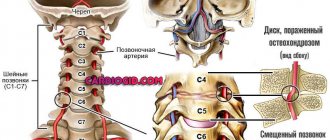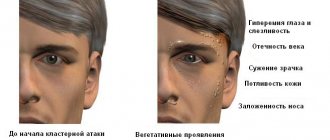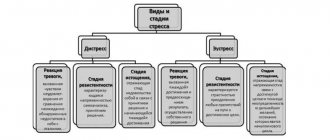Cause of pain during prolonged stress
Long-term exposure to traumatic events affects the functioning of the body. This is a kind of signal from the body that it needs help. Mental pain comes out through disruption of the functioning of any organ. Some scientists argue that most of our diseases are a manifestation of stress.
Physical illnesses caused by stress manifest themselves as follows:
Painful sensations at the moment of short-term shock. This could be a reaction to an exam, an interview, or a conflict on public transport. Such manifestations do not require medical attention; the main symptoms are: headaches, rapid heartbeat, hand tremors.- Functional disorders as a result of a long-term traumatic factor. The person may suffer from headaches and heart pain. In addition, breathing, swallowing, and movement disorders occur.
- Organic diseases. In this case, stress has visible manifestations, for example, neurodermatitis, bronchial asthma. Many disorders in the body are associated with a person’s personality and behavior.
Sometimes it is difficult to track the relationship between pain and stress. It is noted that if the stress factor has not been eliminated, the disease progresses into the traumatic phase. The disease can worsen due to life events, most often the cardiovascular system, skin, gastrointestinal tract are affected, and headaches occur.
Headache: loss of control
If you are a serious control freak, you are in for a real problem. No matter how strong you are, focusing on control will eventually lead to burnout and headaches.
“I would give the child to my husband and get some sleep!”: if mothers turned back time
The right handbag will highlight your figure: which one will suit you?
A girl can easily “turn” into cartoon characters with the help of makeup
Not all difficulties in life can be solved through intelligence or trying to control everything. In fact, most problems are made worse by too much control. Letting go, accepting what you can and cannot control are the basic steps you need to take to get rid of a headache.
The relationship between stomach pain and stress
In life, a situation often occurs that with the same lifestyle and diet, some people suffer from abdominal discomfort and constant indigestion, while others are completely healthy. Scientists have long associated diseases of the digestive system with emotional distress.
People have different resistance to stress; in some cases, the traumatic factor is manifested by pain in the stomach. For some people, divorce, death, or family problems are considered stressful moments. Abdominal pain can also occur from trivial troubles at work.
How does stress manifest itself? Gastritis and peptic ulcers come first. Next comes irritable bowel syndrome. Its symptoms are diarrhea and abdominal discomfort.
If a person cannot cope with problems, he does not have the strength to resist, then there is a desire to run away, hide, hide from difficulties. The body receives these signals, the digestive system ceases to function normally, it shuts down, refuses to digest food, and there is constant pain in the stomach.
As a result of long traumatic experiences, abdominal pain develops into chronic gastroduodenitis, peptic ulcer disease, and biliary dyskinesia. If the stress factor becomes an unbearable burden, then increased sweating, constant fatigue syndrome, and rapid heartbeat are added to the pain in the stomach. A person suffers from insomnia, obsessive thoughts, and agitated sleep.
For abdominal pain, many go to a gastroenterologist, and once the diagnosis is confirmed, drug treatment is prescribed. At the same time, psychotherapy should be added to drug treatment, since eliminating the stress factor will restore the intestinal mucosa and healthy microflora in the stomach. The gastrointestinal tract should be treated in a state of rest, not tension.
The main signs of the relationship between stomach pain and emotional overload:
- Treatment by a gastroenterologist does not bring results, the pain in the abdomen returns.
- Digestion malfunctions when worried; cramps and bloating are regularly felt in the stomach.
- The depressed mood has been present for more than a month.
- Along with abdominal pain, there are other symptoms - fatigue, insomnia, headaches.
Lower back: anger
The lower back is where we push suppressed anger. To alleviate the condition, learn to constructively express negative emotions and resolve conflicts. Learning to harness the power of anger and turn it into creative force is the key to a dynamic and fulfilling life. You'll be rewarded with increased confidence, energy, and healthier relationships.
Duet feature on TikTok: how to enable, ideas for use
Another story of Princess Diana: starring Kristen Stewart
Researchers are trying to find a way to make crops grow in seawater
Gastrointestinal diseases and stress
The causes of gastrointestinal diseases are smoking, poor diet and lifestyle. But one cannot ignore the influence of stress, moral and physical exhaustion. Sometimes even proper nutrition does not save you from stomach pain.
What gastrointestinal diseases manifest themselves with a constant traumatic factor?
- Gastritis. A long-term traumatic factor disrupts the functions of the gastric mucosa and blood supply, so gastritis is a common symptom of anxiety.
Duodenal ulcer. The disease manifests itself in the form of unpleasant pain in the stomach, which is accompanied by decreased immunity and emotional problems. An ulcer is caused by the microbe Helicobacter pylori, but in a calm mental state its development is difficult.
- Biliary dyskinesia. The disease is associated with a violation of the movement of bile, this process is regulated by the peristalsis of the gallbladder. It should be borne in mind that anxiety disrupts the functioning of the entire body, including the gallbladder.
- Irritable bowel syndrome disrupts life and daily activities. Mental overload affects manifestations in the stomach.
Many diseases have mental causes, so treatment by a gastroenterologist and psychotherapist should be comprehensive.
Neck and Shoulder Tension: Burdens and Responsibilities
Neck pain occurs when you take on too many responsibilities. If you are suffering from tension in this area, chances are you have too much on your plate. Instead of asking others for help, you do everything yourself.
Learn to delegate, ask for support, decide what is really worth taking on, and share responsibilities with others.
The relationship between heart pain and stress
Regular stress can lead to many diseases, including those affecting the cardiovascular system. Doctors distinguish between true and psychogenic heart pain, which manifests itself on a nervous basis.
How does psychogenic angina manifest?
- It occurs against the backdrop of painful experiences and prolonged mental trauma.
- Painful sensations in the heart often overtake women before the age of forty.
- Symptoms occur mainly in thin people.
- A heart attack against a background of mental and emotional stress lasts several hours and sometimes days.
- Pain in the heart for psychogenic reasons increases slowly; if you take a nitroglycerin tablet, it does not go away.
- With typical angina, attacks become more severe each time, unlike a psychogenic disease.
- Painful symptoms do not go away during sleep and do not depend on exercise.
It should be borne in mind that heavy sensations in the heart caused by mental causes can disappear once and for all in half of the cases, and also appear in isolated cases.
Symptoms of angina pectoris against the background of nervous strain have their own characteristics. The disease is accompanied by anxiety and a feeling of impending danger. A person feels constantly tired and suffers from shortness of breath. Excitement is combined with painful sensations in the heart. Heart attacks are associated only with nervous overload and chronic stress. When the traumatic situation disappears, the symptoms of angina disappear.
How does an attack occur that is caused by prolonged stress? When faced with a difficult life situation, a person feels discomfort in the heart, aching, stabbing sensations in the chest area, he may suffocate and feel constricted.
Symptoms usually worsen in places where there are traumatic factors. For example, when meeting certain people, at work, in family conflicts. Such an attack can occur several times during the day, and physical activity can interrupt it. When a person does not encounter anxious moments, no attacks are observed.
If a person consults a doctor with complaints of heart pain, he is referred for an ECG. With psychogenic angina, there are no changes on the ECG. In this case, consulting a doctor is necessary, since only a specialist can determine the causes of heart pain and prescribe treatment.
Where does stress hide?
For years, Nathaniel Branden, founder of The Psychology of Self-Esteem, has studied where unwanted emotions accumulate. Of course, not all body pain or illness is psychosomatic. However, people's responses to stress produce recurring patterns.
Fear causes repression and is often rooted in the past. But over-reliance on repression fuels psychosomatic symptoms and self-destructive patterns. Psychosomatic reactions do not always have a clear organization. Much depends on your character and communication style. The list below is best used as a general introduction to psychosomatic symptoms, a starting point for personal exploration.
Knee pain
Psychosomatics experts say that those who experience pressure from others, do not feel support in life, and really need the support of loved ones are susceptible to knee problems. Even which knee the unpleasant sensations appeared in depends on the nature of the emotions. Thus, the right knee often suffers in those who like to argue, criticize others, manage and control them. Pain in the left is experienced by people who are unsure of themselves, who do not dare to express their point of view, and who are in the grip of fear.
Changes in muscles due to stress occur according to the scheme described above. And tense muscles compress the joint, reducing its flexibility. One careless movement and the meniscus becomes pinched or a crack forms in the cartilage tissue. The result is acute pain that does not even allow you to bend your knee.
Help:
- physiotherapy;
- stretching;
- yoga;
- tai chi;
- light massage of the knee with the pulp of half a lemon.
Diagnosing muscle pain due to stress is not easy, and only a specialist can do this after a thorough examination, history taking, and examination. In most cases, a consultation with a neurologist or psychotherapist is also necessary. After this, the doctor will be able to prescribe adequate drug treatment. But it is unlikely to be successful if the patient continues to live in a state of stress. Therefore, it is very important to learn to relax, accept life more simply, not accumulate resentment and remember that in a healthy body there is a healthy mind.
From stress to colds: why even ARVI starts from nerves and how the virus helps the body
All diseases come from nerves, says the old saying. Psychologists clarify that the cause of everything is stress. Even a common cold can be caused by anxiety, fear, and lack of attention. A tired and disliked person came down with the flu - and received the missing portion of rest and care. The child is afraid to go to school - and now fever and sore throat come to the rescue. Psychosomatic medicine sees a direct connection between the state of mind and body. How negative emotions provoke the occurrence of seasonal viral diseases and whether a good mood can scare away a cold - in our material.
Anxiety and fear damage the immune system
At the end of January - beginning of February, there is a traditional increase in the incidence of ARVI. To avoid becoming a target for viruses, it's time to think about prevention. From a psychosomatic point of view, the best option is to restore order in the soul and free yourself from accumulated suppressed emotions. The first step is to pay attention to anxiety.
— Fear and background anxiety reduce immunity because our adrenal glands produce stress hormones: adrenaline and cortisol. Both hormones are needed by the body to cope with stress more easily. They pose a health hazard during chronic stress—when they are released in large quantities,” explains medical psychologist Anna Topyuk. — If anxiety is situational, it is adequate stress. The order “fight” or “flight” appeared - the hormone was produced, the person did something to get rid of the threat that had arisen, and the level of cortisol decreased. But if a person simply suppressed stress, the hormone was produced and remained above normal. The immune system can't handle it.
Fatigue: grievances
Resentment negatively affects the entire body and causes more harm than the people you are resentful of. To blame others, to play the victim, to relive events is to harm yourself. Resentment prevents you from living in the present moment.
Horseshoe crab - an endangered living fossil that could save us from the "corona"
All living beings do not use their brains when searching blindly, scientists prove
Lessons from intelligence agencies' charm: Don't be shy about asking for and accepting help.
The best thing to do in this situation is to focus on forgiveness or moving on. Strive for more fulfilling relationships, take more care of yourself.
Voice and throat problems: oppression
Oppressed people are not allowed to have the right to vote. A person who has grown up in such an atmosphere knows that speaking your mind or expressing your needs is dangerous. In addition, you have an aggressive inner critic. As a result, as an adult, you try to hold back your feelings. When you have the impulse to speak up, you try to silence yourself.
This clash between the urge to speak and the urge to hold on leads to severe tension and problems with the throat and voice. To cope with this, you can keep a journal. Reading poetry out loud also helps.
What happens under the influence of chronic stress?
In the video above, professor of medicine Sharon Bergquist from Emory University demonstrates the processes that occur in the body when a person is under conditions of chronic stress. Let's say you've lost your job or are struggling to cope with post-traumatic stress disorder (PTSD) from childhood abuse.
The body releases excessive amounts of stress hormones too often. His response to stress becomes unbalanced; such a reaction does not help cope with a difficult situation. As a result, the immune system suffers and rapid epigenetic changes begin.
Stress causes nonspecific systemic inflammation, which may result in a sudden increase in blood pressure, an asthma attack, or a lingering cold. It may seem to you that the cut on your leg is not even going to heal, and the skin is in simply terrible condition.
You may also have trouble sleeping and, on an emotional level, feel like you're approaching burnout. It is at this point that you notice that you have gained excess weight and are having digestive problems. Even in intimate life, some difficulties arose.
Stress directly affects every system in the body, but according to neuroscientist Robert Sapolsky in the documentary Stress: Portrait of a Killer, the following conditions caused or worsened by stress are the most common:
- Cardiovascular diseases
- High blood pressure
- Depression
- Anxiety
- Sexual dysfunction
- Infertility and irregular cycles
- Frequent colds
- Insomnia and fatigue
- Problems concentrating
- Memory loss
- Changes in appetite
- Digestive problems and dysbiosis
Pain in the hip area
This type of stress-related pain is not common. As a rule, the joints are affected symmetrically; a person experiences not only pain, but also stiffness in the hips. Often these unpleasant symptoms are complemented by problems in the shoulder joints. The patient experiences severe weakness, chronic fatigue, and sometimes there is loss of appetite and fever.
Help:
- warm bath;
- light massage;
- comfortable position while sleeping (do not lie on your sore hip);
- comfortable shoes.
Pain in the cervical region, shoulder girdle
The cervical region is the most mobile part of the spine and the most vulnerable to tension caused by stress. According to Chinese medicine, the neck hurts when there are problems in relationships with loved ones. Chronic stress causes constant overstrain of the neck muscles, as a result of which they lose elasticity, compress nerves and blood vessels, preventing normal blood flow and causing muscle spasms. Hence the painful sensations.
Help:
- gymnastics, a set of muscle stretching exercises;
- yoga;
- massage;
- walks in the open air;
- relaxing bath with aromatic oils (sage, lavender).
Insomnia: loss of self-control
Many people, when experiencing life-changing events - good or bad - lose sleep. You experience anxiety when life circumstances change. This may be due to stress or some significant events. For many, insomnia is most often associated with fear of the unknown.
Experts recommend writing down your fears or talking about them with a loved one. Learn to embrace change rather than suppress your fear.
Found a violation? Report content
Breathing problems: anxiety
Breathing problems, panic attacks, feeling of suffocation with anxiety. These are symptoms that occur in people who suppress deep sadness. They don't want to cry. Instead, they choose to suppress the sadness, move on, and focus on something else.
But holding back tears is a lot like holding your breath. But if you do cry, you can finally feel some relief. Releasing pent-up sadness is like taking in a breath of fresh air.
I don't want to get up in the morning. Mom says it's because of "unhappy love" for work
Former Trump adviser John Bolton wrote a book about the president
“I’m just not ready!”: Returning to normal life causes Jane to panic
Numbness: Trauma
When we are overwhelmed by some event, we dull our senses. Thus, the psyche tries to distance itself from insurmountable pain or danger. Traumatic events are not always life-threatening - they can be caused by real or perceived danger, abuse or neglect in childhood.
Over time, if you don't deal with the trauma, the memory of it will become ingrained in your body. As a result, any situation in which you feel unsafe will cause you confusion.
The first step to freeing yourself from trauma is to recognize its power over you and ask for help.









